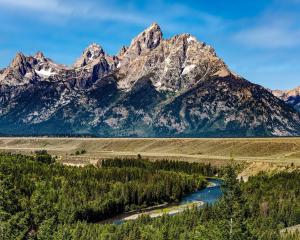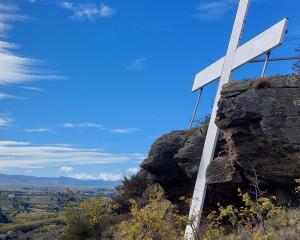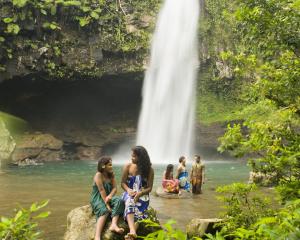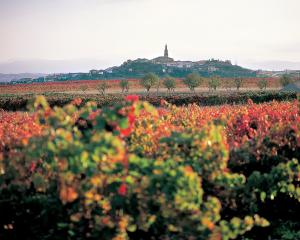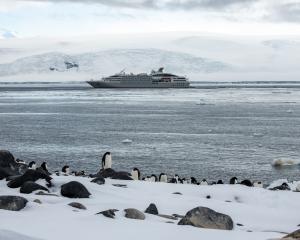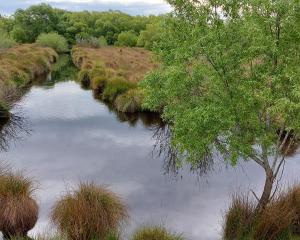Heartbreak and tears may have driven her to Portugal but a ''go for broke'' approach helped with her endeavours to learn to surf, Gwyneth Hyndman writes.
On the back of a motorbike, racing along a cliff above breaking waves, veering smoothly around vans loaded with surfboards, my arms stay in a loose armlock around a man who is dropping me off at what he claims to be the most beautiful beach in Portugal.
He could, if I needed him to, also pick me up again on the way back from what he describes in careful English, as a refresher course.
''A refresher course in what?''
I call out, my voice going into his back, over the windstorm in our helmets.
He struggles to translate.
I am in shorts, sandals and a T-shirt and a helmet he has loaned me for the 5km journey to Praia do Guincho, or Guincho Beach, on the Estoril Coast.
It is a warm, almost humid morning in October.
We make loud, brief bursts of small-talk as we zoom past crumbling fortresses still clinging to rocks.
He calls out their names and their ages as we fly past.
A beach towel and my lunch - two torn pieces of baguette smashed together with cheese and apricot jam left over from breakfast and wrapped in paper - is wedged between us.
I am so nervous my stomach swims with nausea.
Not about this ride to a beach that stuns me and makes my heart widen bigger than I thought it could when I first set foot in Lisbon on Saturday. Today is Tuesday.
I had arrived at the iron front gates of the Cascais guesthouse in darkness the night before, and watched the glow of the taxi disappear as I put both hands on the cold rails and looked up and wondered where the entry point was supposed to be.
Then the lights came on.
A large stucco house, gardens and a pool under huge, thick, widespread trees, with branches like gnarled, swollen fingers were illuminated.
Like most people coming to a new country, I was already overwhelmed by what there was in three days of unscheduled wandering.
As well as 1793km of Atlantic Ocean coastline, Portugal has lush forests, mountain ranges to explore, jazz bars in hidden neighbourhoods to stumble into, fresh tuna and salted cod to taste and art exhibits to wander through.
Ten days, maybe even a year, is not enough to absorb it all, I was realising.
Portugal is and always has been a seafaring country.
Darkened by the riches it reaped in the African slave trade and discovery of gold in Brazil, it also held a powerful position as a port city for the spice route to India.
An independent country since 1140, Portugal was once the wealthiest country in the world, until the 1755 earthquake levelled its economic structure.
It was a poor neighbour to the rest of the European Union family by the time it was absorbed into the EU in 1986.
Agriculture, and industries such as wine, cork production and textiles, now make up the bulk of Portugal's economy, along with tourism.
While many plan to travel here far in advance for the history, the music and the food, I was here for two reasons: to move on from a relationship that had just ended and to finally learn, in my mid-30s, how to surf.
This house, this tourist town 20 minutes south of Lisbon and this wide, golden beach that stretched out before me - like everything in Portugal so far - had been a discovery of a new country of which I had an embarrassing lack of knowledge.
Nothing was what I had expected, because I had washed up here with no expectations after the break-up, which involved a ticket to London that I could not really afford to begin with and by the heartbreak hour was non-refundable.
There were tears.
Then the obvious occurred. Who said I had to stay in England?
The cord was cut.
And so, instead of becoming the final destination, London became a launch pad. I could go anywhere I wanted.
A little more than a week later, I am on the back of this motorbike on the Portuguese coast, hurtling towards what could be a new passion or my death maybe, but most definitely towards certain humiliation.
Friends had tried to teach me how to surf before. Despite my love of the ocean, no-one had succeeded in getting me up on a board.
Maybe what I have needed all along was a go-for-broke approach to public embarrassment.
I had come from across the Atlantic for love and look how that turned out.
I may as well make the most of the freedom I had while I was dwelling at rock bottom.
The question between my ride and I - ''refresher course for what?'' - still hangs there as he tries on a few different words that didn't capture it.
He shakes his head after every word that doesn't get it right.
Then his helmet tilts back towards me as he grasps the right noun.
''Ninja,'' he says, and nods.
''I am in training to be a ninja.''
Of course you are, I think, my world widening even more.
An hour after being dropped off at the beach by the ninja, I was on the sand with two Russian honeymooners and a Portuguese teenager.
The nausea I have been feeling leading up to this moment has dissipated, but still lingers as I watch what is out there.
We are snug in our wetsuits and now warily watch the waves before us.
They are mean and messy.
The wind comes through and decapitates their foaming tops.
And yet the temperature of the morning is warm and electric.
Our boards are lined up, pointing to the ocean.
We are all sweating, and we long to be in there.
Above us, the sun comes in and out of the clouds.
The sand gets hotter between our toes as we stretch our arms high, preparing.
I never caught the name of our instructor.
And as the week went on I was too terrified to ask.
His face was leathered by sun and wind and maybe because I am quiet, he assumed I was also Russian.
When the surge of the wave began to carry me and my board forward that first morning, and my arms worked steadily on either side of me, he swam to me and pushed me forward to catch the wave.
''Mush, mush,'' he yelled.
I am mushing. And then I am there with the surge.
I am carried.
My arms lift my torso up and I make it from a downward dog yoga move to a crouch that feels like it takes ages.
Then I lose my nerve, and my balance, and I come crashing into the water to be rolled, sputtering, on to the sand.
My board, dragging behind me on a leash, hits the back of my legs.
I pull my hair away from my eyes.
My fierce, unsmiling teacher, from the waves, gives me a thumbs up and then a thumbs down.
I give him a weak thumbs up as salt water pours out of my nose.
For the rest of the week, this is my routine. Waking to fresh coffee, warm bakery bread, oranges and yoghurt; putting on a bathing suit, shorts and my favourite Invercargill Forever T-shirt ; wrapping a beach towel through the straps of my daypack and slipping on my sandals.
There is the walk down the street to take out one of the free city bikes, in exchange for my passport number.
Then this long beautiful ride to the beach, along the same road I took on the back of the motorbike that first morning, the waves crashing on the sand to my left as I fly down the hill.
And then this: the movement forward, the lifting up, and the careful, quick, deliberate placement of my feet as I steady myself, and finally the three seconds I manage to stay upright, arms out like I am on a balance beam, stretches out to four seconds.
And then there is the crash into the Atlantic that I have begun to love.
It is like I am being caught by some forgiving element, washed clean and then sent back to shore to catch my breath, before being welcomed back in again.
There is an ache in my arms as I power back up the hill on the bike, on top of the world every afternoon.
I am starving.
I bring enough Euros in my daypack so that I can stop, first of all, for a sumo de laranja - the fresh squeezed orange juice made before your eyes - and maybe even another powerful um pingado coffee (a strong coffee with a dash of milk) that sends shivers through me.
I have a used copy of William Styron's Lie Down in Darkness that I found in a bookshelf of the guesthouse.
It is pulled out of my day pack as I finish the sumo and the coffee and order grilled fish with a glass of white wine.
You would think there would be nothing worse than Styron for a tired heart.
But sometimes rest comes in a perfect paragraph about bitterness and mistakes that cannot be made good.
I was hungry for descriptions of other people's errors on those afternoons.
I would have another wine and stretch out my legs on the plastic red Coca-Cola chairs on the deck of the restaurant, burning through chapters, stopping to stare at nothing, considering their mistakes in love, which inevitably led me to consider mine.
This leisure continued through the evening.
I would have washed the salt out of my hair, put on my nice sandals, and ended up at a restaurant on the side of a Cascais cliff that glowed with a warm light as I walked towards it, book still in hand.
If it was dusk, I could still see the silhouettes of fishermen casting their lines out to sea on the rocks beyond the windows of the restaurant, the sky orange behind them.
I would sit by myself next to the window, take pictures of night coming down over the ocean and read.
During my stay I met Chela, a radio broadcaster from a small town outside Mexico City, who had come early to Cascais for a Buddhist retreat.
One afternoon we walked to the centre of Cascais and took a bus to Sintra, a town that was once the holiday retreat for Portuguese royalty and a famous haunt of Lord Byron.
The dampness in the air, the fog at the base of mansions surrounded by thick trees and covered in vines, with tiny cobblestone streets that wound up to their great walls, were full of intrigue, and we explored them for hours.
I heard beautiful singing coming from one of the shops we passed.
I pulled Chela inside to find out who it was.
I learned about Fado, the folk music of widows left behind by seafaring husbands who were lost to their trade and never came home.
I left with an album of Anna Mora, a Portuguese Fado artist.
On the way back to the bus, Chela and I stopped at the Cantinho do Lord Byron pub for a glass of wine, packed shoulder to shoulder in the tiny space where the English poet apparently once drank.
And in the morning, it was back into the Atlantic.
On my final day as I did the painfully slow arranging of limbs to stay upright, the skies opened up and it began to rain hard.
Then it was hail I felt coming down on my face when I looked up.
The wind and waves lashed us. In the middle of this, I was like a slowly evolving picture series of modern man, finally upright in the chaos, my wingspan out wide on either side of me.
It was glorious. I did not want to stop doing this, ever.
After my final morning I returned my board and my wetsuit, said goodbye to the crew who had propelled me into the wave's power and left me to it.
Chela dropped me off at the train station for the 30-minute journey back to Lisbon.
My bathing suit dried on top of my pack, which sat beside me like a second passenger as the glistening ocean, train platforms and graffiti passed by and we entered the city.
Under my T-shirt was a red welt that ran from my right shoulder down my back from slamming into rocks two days before.
I was glad to see that despite the thick wetsuit I had been wearing there was a mark that would be there for weeks.
I kept reaching back to touch it.
That night, back in Lisbon, I went searching for Fado music in the Bairro Alto neighbourhood but did not get far.
The clouds that had hovered over the city that day opened up once again, and it was as if buckets of water were just being dropped on to the cobblestone streets from above.
I had nothing to protect myself with.
I was drenched in moments and like other pedestrians around me, I found my own doorway to huddle in until the showers passed.
Rainwater washed down the near-vertical street from above.
Between the water up to my ankles and the upward climb that seemed to go forever, I abandoned my search for a Fado bar and instead headed back into the riverside Cais do Sodre neighbourhood I had been staying in.
Hours later I had not moved from Bar da Velha Senora, the cavernous jazz bar I had found in the rain on the bright pink Rua Nova Corvalho.
A jazz trio brought in patrons of all ages and the small round table where I finished my book while waiting for the rain to stop was soon filled up.
One of the musicians' girlfriends sat next to me.
She was French but had come to Portugal for her boyfriend, who played the bass, and because she was pursuing folk music.
She gave me her card and a website for her latest YouTube clip. She left before they finished for the night.
I tucked her card into my Styron novel, which I had just finished, and sat back with my wine.
My hand, once again, almost absently touched my bruised shoulder.
My flight back to London was in six hours.
I ordered another glass of wine, prepared for the hours ahead.
There was no reason to sleep.
I could just get a taxi from this bar and pick up my bags on the way to the airport, I reasoned, feeling rested, strong, and washed clean by the Atlantic, nearly ready to go home with what I had learned and keep returning to the sea, unafraid.
If you go
Getting there
There are no direct flights from New Zealand to Portugal's main hubs in Lisbon and Porto, although multiple airlines offer flights via stops in the US, the UK and Asia. Regular flights from London are offered through British Airways and Portugal's national carrier TAP (www.flytap.com). Trains to Cascais - about a 30-minute journey - leave every 20 minutes from the Cais do Sodre station near Lisbon's Rua do Arsenal on the riverfront. Buses to Sintra depart regularly from Cascais. Service directly to Sintra is also available from Lisbon via Lisbon's Sete Rios and Rossio train stations.
When to go
July and August are Portugal's hottest, busiest months, when accommodation prices peak. Travellers are better off coming to Portugal in May, before the heat and crowds hit, or in October when the weather cools, with mild temperatures during the days. Downpours are common in all seasons but Portugal's wettest months are in the winter, from December to March.
Where to stay
Lisbon has a multitude of accommodation options for all budgets, ranging from manor houses to private rooms and holiday properties (www.golisbon.com). In Cascais, the Hotel Fortaleza Guincho (www.fortalezadoguincho.pt/) offers luxury accommodation in a hotel built on the site of a 17th-century fortress, with views to the surf beaches of Guincho. At the other end of the price range, the Guincho Surf House (www.guinchosurfhouse.com) has private rooms, B&B options and a surf coaching package.
Where to eat
The Casa da Guia complex on the Cascais cliffs above the sea holds a handful of restaurants and cafes within a grove of pine and palm trees. Here Bistro Garbo offers up a Swedish take on Portuguese fare and generous portions of sangria, with ocean views and shabby chic decor. Mar do Inferno has traditional Portuguese seafood platters in a simple setting near the Boca do Inferno. The Fortaleza do Guincho boasts a fine dining restaurant run by 3-star Michelin chef Antoine Westermann, featuring a wine list with more than 800 selections.
Surfing in Portugal
Lisbon is a great launch pad to explore Portugal's surfing beaches, many of which are a short train or car ride away and have breaks for beginners to advanced surfers. A mild climate and consistent north, south and west swells make Portugal a top surf destination in Europe, with waves averaging 2.5m-3m in the winter and about half that in the summer. Numerous surf schools have popped up along the coast, offering clinics, tours and surf and stay packages, catering to a wide range of capabilities. In Cascais, Moana Surf School offers group and individual lessons at Guincho Beach, as does Cascais Surf School and Camp (www.surfcascais.com). Lisbon Surf Camp (www.lisbonsurfcamp.com) has options that include accommodation in the Biarro Alto of Lisbon and daily surf instruction rates at a number of nearby beaches. For surf packages beyond the Lisbon area, check clinics and camps at LUEX, a travel operator that specializes in adventure surf trips around Portugal (www.luex.com)



